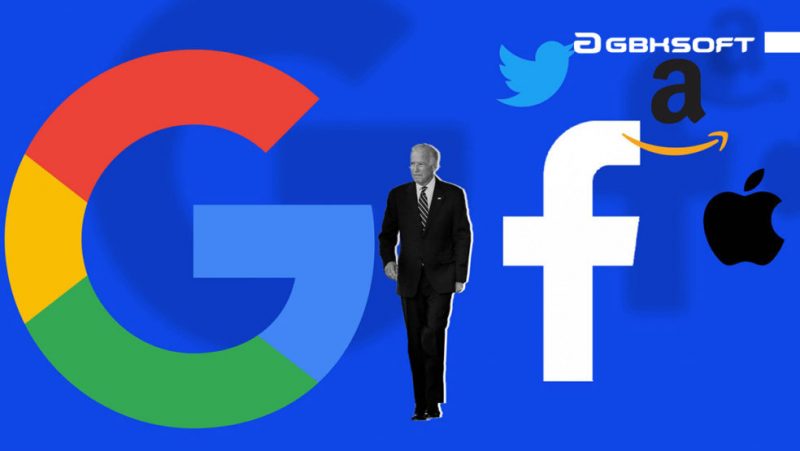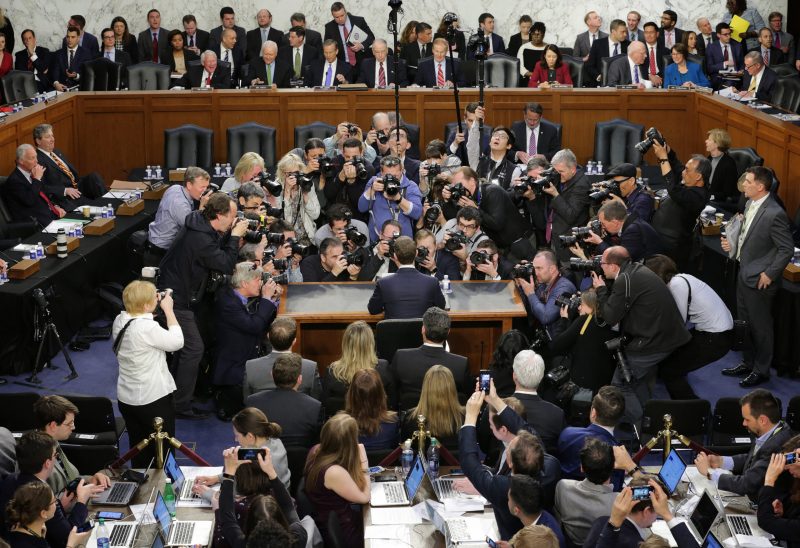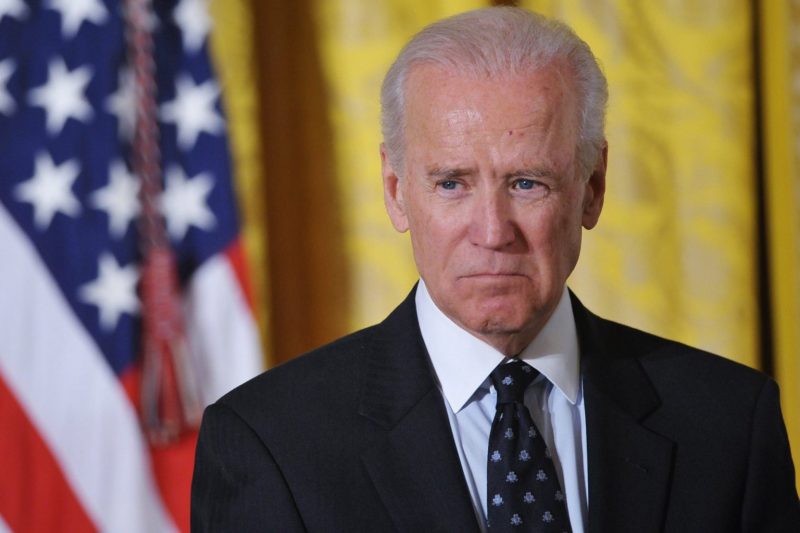
American IT giants believe that although Trump’s protectionism is wrong in form, it is right in content. They are expecting the Democrats to ease their policy. Biden remains silent.
Literally as soon as CNN announced Joe Biden’s victory in the US presidential election and other media outlets followed suit, the incumbent President Donald Trump launched a full-out war against Twitter… on Twitter.
He complained that the vote-counting process was too slow and provoked his opponent, but the social media company methodically hid his Tweets from users, tagging his posts as containing “disputed and potentially misleading information”.
This battle had been going on with the country’s president since long before the election. Trump repeatedly criticised Facebook and Twitter for conspiring against him and silencing conservative users.
And this was amid a scandalous investigation into the fact that Facebook algorithms had allegedly helped him win the 2016 presidential election.
It should be remembered that it was Trump who launched a lengthy trade war with China and tried to curb Huawei and ban the Chinese apps WeChat and TikTok. China had been counting on a Biden win in the hope that it would thaw relations.
The trade deal that Trump struck a year ago has essentially fallen through because of the coronavirus pandemic.
China can no longer purchase the volume of goods promised, and the agreement on respect for intellectual property that was a crucial element of the deal has effectively been put on the back burner.
But Biden’s arrival should not be misunderstood. The Democrats are just as unhappy with large IT corporations, they just see the threat they pose slightly differently, and they will not be in a hurry to smooth over relations with China either.
Democrat representatives and the experts working alongside them are already making it clear that the main problem with Trump’s technology policy was not so much the confrontation with China (they see this as sensible), but the exclusion of allies from this confrontation – primarily the EU, Britain and Japan.
In all likelihood, Biden will try to build relations with them first, then they can join forces to continue putting pressure on China.
With specific reference to America’s IT corporations, the Biden team has not yet put forward a clear strategy other than to call for social media companies to do more to combat disinformation.
It will be recalled that Google, and Eric Schmidt personally (the company’s former CEO and now its technical advisor), was one of the first to back Biden’s campaign. It has also been revealed that the new Vice President Kamala Harris has indirect links with Uber: her brother-in-law is one of the company’s top managers.
At the same time, the large-scale antitrust investigation against corporate giants continues. Democrat supporters say that social media companies and all the Internet giants have been using manipulative algorithms for years to keep users in their systems for as long as possible.
So, every minute spent on Instagram, Facebook and so on comes at a price and makes a profit for the corporation. In conditions of market saturation (the growth in the number of new users is understandably limited), all companies can do is increase the length of visits and fight with competitors for users’ time.
From the Democrats’ perspective, this distorts both the market and the principles of social responsibility. Not only does this have an economic effect – the distortion of market signals due to the revaluation of companies’ market values – it has also led to a significant increase in the suicide rate among US teenagers over the last ten years.
The implementation of restricted functionality at the software level, parental controls and marketing campaigns (focusing on privacy, personal data and responsible use) has not solved the problem. Democrats and Republicans alike are of the view that society is increasingly turning its back on IT giants.

The Obama era will not be repeated
As president, Trump repeatedly aired his grievances on social media, but he did little to stem the rising economic power of the major IT companies. The combined market value of Amazon, Apple, Facebook, Google and Microsoft has tripled from the $2.3 trillion that they were worth on election day in 2016.
These five companies currently account for almost a quarter of the total value of the S&P 500, roughly double their share of four years ago.
Formed in 2008, the Apple Store is now bringing the company an annual profit of more than $60 billion from developers’ fees alone. In response to accusations of high fees and monopolism, Apple immediately pointed out that the whole ecosystem brings the market ten times more money than the IT giant itself makes.
The forced dismantling or break-up of such an online shop will lead to a serious crisis in the online marketplace and could slow down the digital economy.
However, critics believe that monopolies are already slowing it down now, arguing that startups are being forced to adapt to markets and platform requirements established by the IT giants, which is holding back the kind of breakthrough innovations that were responsible for creating the industry in the first place.
Dissatisfaction with the tech giants began to escalate among the liberal political class during the 2016 presidential election.
The previous election campaign highlighted the extent to which social media companies can influence political discourse and just how big individual Silicon Valley companies have become.
Today, many Democratic Party representatives consider the word “algorithm” to be a dirty word associated with racial prejudice and political bias.
Facebook co-founder, Chairman and CEO Mark Zuckerberg arrives to testify before a combined Senate Judiciary and Commerce committee hearing in the Hart Senate Office Building on Capitol Hill April 10, 2018 in Washington, DC.
Zuckerberg, 33, was called to testify after it was reported that 87 million Facebook users had their personal information harvested by Cambridge Analytica, a British political consulting firm linked to the Trump campaign.
While the EU believes that monopolies need stronger regulation, the US – and this is the most likely scenario with Biden – continues to wait for the market itself to come up with the right solution.
Instead of initiatives regarding the forced breakup of companies put forward by a number of senators, this approach will mean that the Biden administration, just like the Obama administration, will deter mergers and acquisitions.
Deals between companies like T-Mobile and Sprint, Time Warner and Comcast were put a stop to under Obama. For the time being, however, there are still deals going on: on 1 December, Salesforce and Slack announced a $27.7 million merger deal.
Another issue on the agenda is section 230 of the 1996 Communication Decency Act, a “gift” from the government to social media companies that Trump tweeted about during the vote count.
The act protects internet companies from certain types of legal liability arising from content posted by their users. Liberal critics of the provision say that it reduces the incentive for corporations to deal with online harassment and incitement. Those in favor argue that companies should demonstrate political neutrality.
Social media companies, meanwhile, are seriously afraid of problems, and this is already noticeable in their actions. During the presidential election, Facebook removed virtually all political advertising from its newsfeeds, and not just in the US.
YouTube is also experimenting with algorithms: the election took place more than a month ago, and many bloggers noticed that political content was no longer at the top of search results and was gaining fewer views overall.
It is not known exactly what companies are changing in their settings, and this lack of transparency could also become a subject for investigation.
Moving away from Trump’s protectionist actions is positioning Biden as a more likely ally of Silicon Valley, an echo of the Obama years when Democrats and technology companies were close. Many big tech leaders did not support Trump in 2016, and many this time donated to the Biden campaign.
The eight years that Barack Obama was in office not only coincided with the tremendous growth of US high-tech companies – from Facebook and Twitter to hundreds of small startups – they also overlapped the more general trend of a technological paradigm shift in information technologies. It was after the 2008–2009 crisis that the new era of Web 2.0 took hold, which marked the internet moving under the control of technology platforms.
During Biden’s vice presidency under Obama, surveillance was a serious problem for the administration. The activities of the US National Security Agency were exposed by former employee Edward Snowden, and the FBI struggled to force Apple to unlock the iPhone of a shooter from San Bernardino.
Experts have frequently said that it was with Trump’s arrival in 2016 that the tide began to turn and the techno-optimism came apart at the seams.
But back then, it all began with the scandal surrounding the possible influence of social media on the election result, and four years later, when Biden won, the same claims were made but from the other side.
It seems that after billions of dollars in fines and dozens of hours spent explaining before Congress, Facebook and others no longer know which strategy to pursue. In an interview with The Associated Press, Biden himself singled out Facebook CEO Mark Zuckerberg, calling him a “real problem”.
The battle with China will continue
With regard to the trade confrontation with China, Biden’s position here is more or less identical to the policy pursued by his predecessor. In his speeches and in his actions, Trump repeatedly portrayed China’s economic rise as a threat to US trade and national security.
That is what his attempts to ban Huawei, WeChat and Tiktok were all about. China had been hoping that a Democrat president would pursue a more lenient policy, but, throughout his election campaign, Biden consistently attacked China with the same fervor as Trump.

As a presidential candidate, he not only promised to take even more aggressive actions on trade with China, but he also proposed reorienting government procurement towards the domestic market, announcing plans to invest $400 billion in support of US production as part of the “Buy American” programme.
Biden is expected to stick to a hard line on most Chinese issues, including on export restrictions with regard to Huawei.
However, he will probably garner more support from international allies and follow a more consistent policy than Trump, who regularly announced new decisions only to then retract them via Twitter.
“The United States does need to get tough with China. If China has its way, it will keep robbing the United States and American companies of their technology and intellectual property.
It will also keep using subsidies to give its state-owned enterprises an unfair advantage – and a leg up on dominating the technologies and industries of the future,” Biden wrote in Foreign Affairs magazine back in the spring.
He believes that the best way to stand up to China is to build a “united front” with allies. “When we join together with fellow democracies, our strength more than doubles. China can’t afford to ignore more than half the global economy”, Biden stressed.
In addition, Biden is expected to invest more in basic research and ease certain restrictions on the immigration of highly qualified specialists in order to provide the US with more resources for technological competition.
However, Biden’s real problem in the coming months will be the pandemic, because it was his criticism of Trump’s handling of the crisis that largely won him the election.
Analysts at The Economist are restrained in their assessment of whether vaccinations will have a quick impact, and it is quite possible that the new administration will spend the whole of 2021 proving that its handling of the crisis is no worse than that of the previous administration, giving TikTok, Facebook and other symbols of the techno war more time to reach a deal.
***
Published by
Republished by The 21st Century
The views expressed in this article are solely those of the author and do not necessarily reflect the opinions of 21cir.
